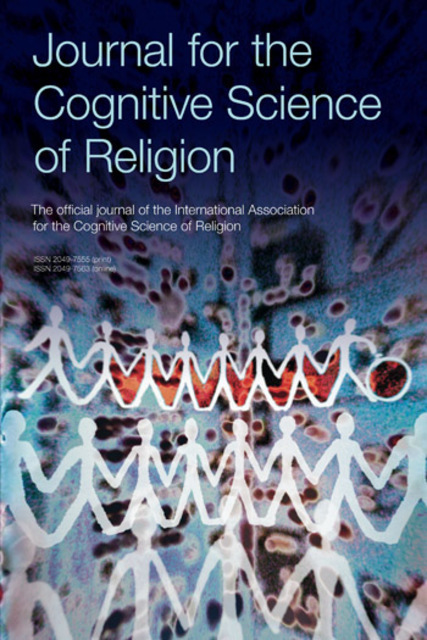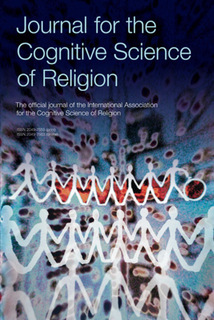Journal for the Cognitive Science of Religion
Journal for the Cognitive Science of Religion is the official journal of the International Association for the Cognitive and Evolutionary Sciences of Religion (IACESR). The Association was founded in 2006 and since then has sponsored a number of international collaborative projects and biennial conferences.
The cognitive science of religion is a burgeoning field that finds itself in the center of cross-disciplinary research. Cognition is understood in a variety of ways from bottom-up to top-down models and theories. New insights into cognition, culture and religion are being discovered, new ways of doing research are being established and new methodologies and technologies are being used in the cognitive science of religion. The number of scholars and scientists working in this exciting field are expanding exponentially, and the journal provides a cutting-edge publication channel for their research.
The editors will consider the following types of original papers:
General and research articles (maximum 6,000 words)
Research reports (up to 4,000 words)
Short Reports (up to 2,500 words)
Commentaries, Addenda, and Book Reviews (up to 1,500 words)
Invited target articles (up to 8,000 words)
Publication Details & Frequency
Continuous online publication comprising 2 issues per volume year
ISSN:2049-7555 (Print)
ISSN:2049-7563 (Online)
Religion Library Collections
Theory, Method & Speical Topics (Core Journal)
Selected articles included in other collections as designated below:

Latest Issue, 10.1/2
Read Editorial Below
Editorial
Reflections on the Cognitive Science of Religion
Armin W. Geertz, 1-5
Book Panel I: Religion Evolving: Cultural, Cognitive, and Ecological Dynamics (2022)
How to Bridge Cognitive and Cultural Models of Religious Evolution
Joshua Conrad Jackson, 6-17
The Devil’s in the Details
Brian Malley, 18-29
Religion Devolving? When Shared Ritual Engagement with Supernatural Agents Becomes Maladaptive
F. LeRon Shults, 30-39
Cultural, Cognitive, and Ecological Dynamics of Individual Religiosity
Eva Kundtová Klocová, 40-48
Religion Is of Reduced Importance When Not Needed to Solve the Problems of Social Living
Catherine L. Caldwell-Harris, Daniel L. Everett
49-61
“We Got Tired” Function, Dysfunction, and the Invisible Host of Religious Failures
Hugh Turpin, 62-70
How are Religious Systems Ultimately Adaptive?
D. Jason Slone, 71-79
Sacrifice, Secrecy, and Sexual Conflict in Small-Scale Religions
William Buckner, 80-89
Costly Signaling as an Integral Part of the Systemic Approach to Religion: Critical Assessment from within the Field
Radim Chvaja, 90-99
Religious Systems Evolving II: Response to Commentators
Benjamin Grant Purzycki, Richard Sosis, 100-124
Book Panel II: Ritual: How Seemingly Senseless Acts Make Life Worth Living
An Overview of Dimitris Xygalatas’ 'Ritual: How Seemingly Senseless Acts Make Life Worth Living' (2022)
Jordan Kiper, Nick Mauro, 125-133
Invisible Rituals: From Cultural Models to Prototypical Rituals
Renatas Berniūnas, 134-144
Seemingly Senseless Acts: Who and When
Michael Nicholas Stagnaro, 145-159
Some of the Understudied Dimensions of Ritual
Benjamin Grant Purzycki, 160-170
Are Rituals Causally Opaque? The Case of Ritual Fasting and Drug Use
Caitlyn Diane Placek, 171-181
The New Anthropology of Ritual
Jordan Kiper, Nick Mauro, 182-194
Ritual Explained? Some Issues and Challenges for the Cognitive and Evolutionary Study of Rituals
Jakub Cigán, Jan Krátký, Radek Kundt, Eva Kundtová Klocová, Martin Lang, Peter Maňo, 195-201
The Ritual Spectrum: Definitions, Frameworks, and Implications: Response to Commentators
Dimitris Xygalatas, 202-215
Resources
Information
International Advisory Board
- This text has 0 annotations
- This text has 0 highlights
We use cookies to analyze our traffic. Please decide if you are willing to accept cookies from our website. You can change this setting anytime in Privacy Settings.

